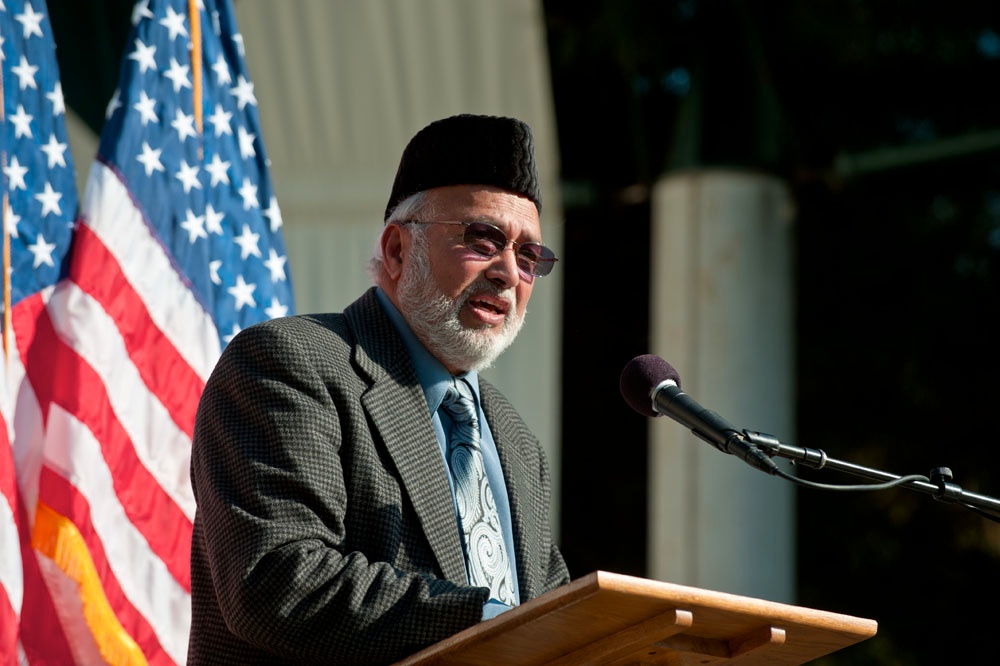SEPTEMBER 29, 2022 BY DR. DILIP AMIN
People may interpret the Quran in a binary fashion as for believers and for non-believers/kafir. While on one hand, the holy book bestows the best of earth and heaven upon the devout followers of Islam, it issues stern warnings and punishments against the kafir. However, the question remains whether the 1.2 billion Hindus are considered believers or kafirs. It is a subject open to debate.
According to Dr. Mike Ghouse, a Muslim author, punishments and warnings as propounded by the Quran, should be understood against the historical perspective of a nascent religious community fleeing persecution. Islam strictly prohibits wars or attacks on others, but if people’s belief system and their way of life feel threatened, they would defend their rights to live their lives.
Here, two Islamic experts concluded that
- Hindus are believers and thus not kafirs, and therefore
- There is no need for a religious conversion of a Hindu for a Hindu-Muslim marriage.
This is certainly a progressive interpretation of the Quran. It is hoped that other Islamic faith leaders will endorse such interpretations to help build bridges between the two communities.
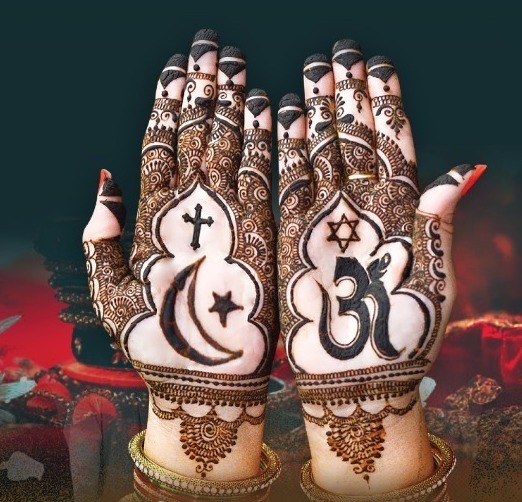
In this article, three “independent” views are presented–two by Muslims and one by a Hindu. It cannot be ascertained whether they all endorse each other’s perspective or not.
- Hindus are not kafir –by Imam Iftekhar Hai
- Hindus are believers: Practical implications to Hindu-Muslim Marriages –by Dr. Mike Mohamed Ghouse
- A Hindu’s perspectives on Kafir –by Dr. Dilip Amin
- Summary
Hindus are not kafir
–By Imam Iftekhar Hai
In every religion, there are interpreters that take a liberal and pluralistic view as well as those that take a non-inclusive view.
Living in India for 22 years has taught me there are several sects and several interpretations to Holy Scriptures. I am raised in a very pluralistic thinking household hence I have never considered a person of any other faith as Kafir or non-believer.
Going to a Catholic missionary school in Mumbai, India I learned Jesus’s saying: Do not Judge others lest you not be Judged.
However, in 1965 I moved to Karachi, Pakistan to find a job and I ended up living in Pakistan for four years. There the interpretation of Quran and Hadith were more on excluding people of other faiths. The only right religion is Islam and Muslims are the only chosen people to spread that message to other religious groups. I cannot agree with those non-exclusive thoughts and ideas.
In 1969 I moved to San Francisco, USA and ended up obtaining American citizenship. I have been living in the USA for the last 53 years. During the last 45 years I have been involved in politics and the interfaith movement in the San Francisco Bay Area.
I see these days, great changes and reforms are happening among American Muslims.
Iftekhar Hai: Hindus are also people of the book
What is Islam?
The Quran is very clear in explaining the definition of the word Islam. The uniqueness of this word is that it is not named after any person (in this case our Prophet). It means total surrender or submission to the Creator of all humanity.
People have always called their Creator by various names like: Allah, God, Bhagwan, Adonai, The Great Spirit, etc.
When Muslims say their religion is Islam, what they are saying is they are aligning themselves of what was ordained by God to be the religion of all humankind… which is total surrender and submission. This total surrender and submission are done voluntarily and in the most peaceful ways.
The Quran says that the religion (Islam) of all the Prophets is submission and surrender to the One Supreme Creator.
There are numerous ways of submission and surrender with the core principles always remaining the same in all the religions. For example, Muslims five pillars of Islam are found in all the religions that is: belief in One Creator, prayer, fasting, charity and pilgrimage.
The following Quranic verse proves that Islam was the religion even before Prophet Mohammed (pbuh) was born; as is evidenced in Surah 42:13:
“The same religion has He established for you that which He enjoined on Noah. That which We have send as inspiration to you (Mohammed pbuh) and that which We enjoined on Abraham, Moses and Jesus (Buddhism, Hinduism and other paths are also included that existed before the coming of Prophet Mohammed) that you should stay steadfast in religion (submission/surrender to our Lord) and make no divisions therein. (This means work for the unity of humankind) As for those who worship other things than God (meaning – money, power, idols, humans, etc.), they are on a difficult and wrong way (hard) to call from. God chooses to Himself those whom He wills and guides those people who turn towards Him.”
According to above, if a Christian, a Jew or any believer from Buddhism or Hinduism surrenders to One Supreme Being, they are falling within the definition of the word Islam which means total surrender or submission. The art of surrender or submission is called Islam. This art of submission/surrender was shown to all the Prophets and their people as evidenced in the Quran 10:47, 14:4 and 16:36 which says, “To every people we send an Apostle in their own language and in their own country to clarify.”
Islam is very inclusive and broad in its definition. Muslims believe in Allah (God) and take Mohammed (pbuh) as their role model—a messenger; just as Christians and Jews believe in the same God and take Jesus and Moses as their respective messengers.
Likewise, the Buddhists and Hindus also have been blessed with their Apostles (gurus or learned people). Muslims believe in the Holy people coming from all the major and minor religious sects with the same core message.
Muslim scholars strongly recommend not to judge believers from other faiths. The depth of surrendering or submission of other believers is known only to God who is All Knowing and full of perfect Wisdom. God is THE ONLY JUDGE fully capable of passing judgments. Here Jesus advice is more relevant, “Do not Judge others lest you not be judged.”
Surah 3:85, “If anyone desires a religion other than Islam, never will it be accepted of him.” Here the definition of the word Islam must be taken in its inter-religious and global context as explained above.
What is Kafir or Infidels?
The word Kafir is derived from the Arabic root word KFR, (Kaf, Fay and Ray) which means to cover, conceal or hide. What is more important is the intentional misleading, deceiving or suppressing the truth. Meddling with the Holy Scriptures where intentionally truth is either concealed, changed, omitted, misinterpreted so that people either begin to doubt or lose complete faith in God, His Signs and His Revelations–this can come in the area of infidelity (being unfaithful to your Creator) or Kufr.
Character assassinations of Biblical and Quranic Prophets, done intentionally to undermine the faith or trust/believe in God, His Signs and Revelations can also be classified, as Kufr and people committing such acts are called Kafirs or infidels.
One cannot call a believer in God from other faiths as Kafir if they do not believe in Prophet Mohammed (pbuh) as Messenger of God and the Quran as final revelation.
In modern language, you can say, it must be intentional dishonesty, deception and misinformation. Just like a more sophisticated, premeditated perjury is deep rooted in intentionally misleading or deceiving people which can lead to criminal actions. We have to consider the extent of intentional deception or perjury in explaining Kafir or Kufr.
Infidel does not really represent the true meaning of the word Kafir. The dictionary merely says an infidel is one who does not belief in any religion, like Christianity and Islam.
Hindus are not kafir
Hindus, Buddhists, Jains and Sikhs (Dharmic faiths), who comprise 25% of the world’s population, cannot be classified as non-believers or as kafir. They believe in God, the Last Day or life after death and believe in doing righteous deeds.
Dharmics have also been shown the art of surrender, submission or devotion (which in Arabic is called Islam and in Sanskrit as Bhakti).
The Quran says, “To every people we send an Apostle in their own language and in their own country to clarify God’s message” (Quran 14:4, 10:47 and 16:36).
Muslims are commanded to believe in the revelations that have come to them (the Quran) and the revelations that came before their times (Torah, Psalms and Gospels, Buddhists and Hindu scriptures) (Quran 2:4).
Hence believers in One God from other faiths cannot be lumped or stereotyped as non-believers. No one has the authority to judge others. Hence, all Dharmic cannot automatically be called kafirs/Infidels.
The Quran uses Kafir in reference to the pagan Arabs who had unleashed war on Prophet Mohammed and early Muslims. All the verses on war in the Quran must be taken in reference to the pagan and idolatrous Arabs. Muslims look towards war in the Quran to stop tyranny and oppression of the pagan Qureshi tribe. The other side of war was to establish freedom, liberty, women rights and a better law-abiding society.
Christians and Jews who lived during the times of Prophet Mohammed were never defined as Kafirs or infidels. They are called “People of the Book” throughout the Quran. Prophet Mohammed included them as part of the Medina Constitution where their places of worship were protected and respected. This is a very important observation that we all should know.
Hence believers in One God from other faiths cannot be lumped or stereotyped as non-believers. No one has the authority to judge others. Hence, Hindus cannot be called Kafirs because they also have been shown the art of surrender, submission or devotion which is the true meaning of the word Islam.
In summary, Hindus are not Kafir and interfaith marriages can be performed as per the mutual agreement of couples and their respective families. There is no need to change religion for the Muslim-non-Muslim marriage.
Imam Iftekhar Hai is a founder and President of United Muslims of America Interfaith Alliance. Read more of his views here.
Hindus are believers:
Practical implications to Hindu-Muslim Marriages
–Dr. Mike Mohamed Ghouse
The Quran calls for believers to think and question everything, which is what we will do here as a prelude to the question, are Hindus Kafirs?
Kafir is an individual who rejects the truth about God and the accountability of their actions. Let me unpack this through a series of questions:
Do Hindus reject the existence of God?
Not at all.
Personally, I know of no Hindu who rejects the existence of God.
Is Allah a God of Muslims?
Not at all.
Allah is the name of the ‘creator God’ of all the universe. Allah is not a being or a thing; He is not the property of Muslims or any group. It is simply a name for the energy or the Noor that caused the universe and everything in it. Let me put it this way, Allah is the common causer of all creation.
Does Allah have many names, or limited to one?
Indeed, Allah has many names.
Muslim scholars have pulled 99 words out of the Quran representing each attribute and called it Asma-e-Husna. The number 99 means unlimited. The Hindus have Sahasranama, a thousand names; again, a thousand here represents infinite.
Do Hindus believe in one ultimate God?
Yes, they do.
Do Hindus believe in multiple Gods?
Not at all.
Hindus believe in Asma-e-Husna, different attributes of the same God. The creator, sustainer, and the recycler are the main attributes, and there are many more representations.
Do Hindus believe in accountability for their actions?
Yes, they do.
The law of Karma is working its way. When one is free from harmful actions to fellow beings, they are liberated from the cycle of birth or the pangs of conscience and receive Moksha, freedom, liberation, salvation, Mukti, Nijaat, etc. Moksha is the state of mind or soul without tensions, hassles, apprehensions, fears, and anxieties, and it is free from all that.
What do Muslims have in terms of accountability?
Muslims are to account for their actions on the Day of Judgement, and if they have done more good Karma, they will be liberated and get a pass to paradise. And what is heaven? Do you see anything different than Moksha?
The bottom line is the same for Muslims and Hindus–freedom!
Atheists and Agnostics may not believe in God or being accountable to anyone, but accountability is the function of living amidst others. Whether a Muslim, Hindu, Christian, or an Atheist, if he rapes, kills, or steals – he will get the same punishment from the civil society.
Are Hindus Kafir?
Historically, Kafirs were the specific group of people from among the Meccans who harassed, chased and persecuted the believers. They were some of the Meccans and not all of them.
Shamefully, the term Kafir was used as a derogatory term and should not be acceptable in any civil society. Hindus are not Kafirs. Mr. Iftekhar Hai above has put together good arguments as well.
When you hear the phrases, “Total Surrender or the Art of submission.” It simply means subscribing to the rules for creating cohesive societies, where all of us can live in harmony and without fear. After all, everything in nature runs precisely whether it is the sun, or the tilts of the earth, to give seasons and sustain life. There is a system created by every religion to create safe societies.
The purpose of religion is to create cohesive societies where all of God’s creations can live securely and in harmony regardless of their race, belief, culture, ethnicity, or any other uniqueness. God created everything in balance, and he expects us to sustain that.
Our words and actions should respect and accept the otherness of others. Live and let live. What is our loss if someone worships God in a different way than you? Really, what is your loss?
Hindus are not Kafirs, and let’s consciously remove the abuse of the word to use it derogatively. We are all from Adam and Eve, or we are all part of the Vasudhaiva Kutumbukum.
Can a Muslim woman marry a Hindu man?
For a long time, Muslim men married women of the book–Jews, Christians, and Muslims (Abrahamic), while Muslim women rarely married outside Islam. Likewise, Hindus married only within their faith or sometimes to others from the Dharmic (Buddhist, Jain, and Sikh) traditions. These norms are changing; now Muslim woman can marry a non-Muslim man.
In America today, according to the Pew and Dr. Amin’s surveys (38% Hindu, 45% Muslim), about 40% of Hindus, Muslims and others marry interfaith. This trend is gaining momentum. This article is written to promote pluralism and equality in Hindu-Muslim marriages.
The increased interfaith marriages are due to globalization and the secularization of societies. Today’s young Hindus and Muslims who grew up as minorities in American schools or at the workplace are continually exposed to each other, spend time together studying, dining, and working, and sometimes falling in love.
Initially, faith is not a consideration in their relationship, but it becomes an issue when the couple decides to get married. Lovers have no filters, but parents and societies do. Parents are not at fault either; they cannot fathom the relationship, because they grew up in closed-minded societies with historical conflicts between Hindus and Muslims.
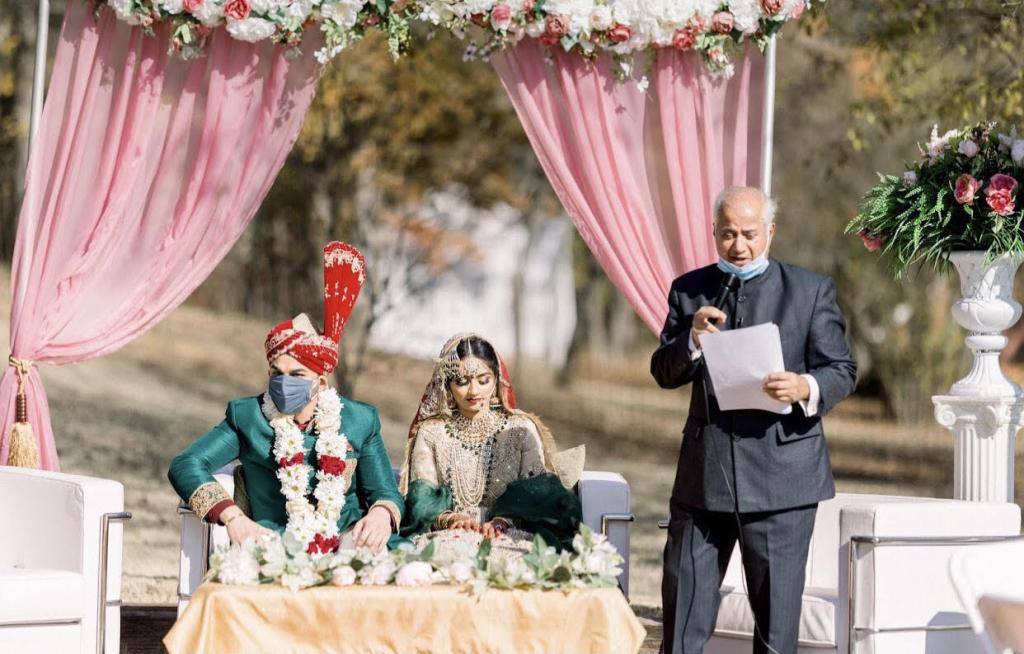
Scriptures
It is said that if God did not want a Muslim-Hindu marriage, it would have been said in the Quran or Geeta. God does not make mistakes; instead, he empowers us to figure out our own equilibrium. Further, the Quran calls there is no compulsion in matters of faith. [Quran 2:256]
“And among His signs is that He created mates for you from among yourselves (it could mean a Muslim as well a Hindu) so that you may find tranquillity in them; and He placed love and compassion between you. In these are signs for people who reflect.” [Quran 30:21]
Indeed, the Quran is a universal book of guidance for Muslims; it does not say God puts love between two Muslims but two humans as if He has installed magnetic attraction between two individuals that brings them together. Therefore, there is no reason to believe Quran will restrict a marriage of Muslim to a Hindu (where “Hindu” should mean the person will remain the same after the marriage and till death).
India’s renowned poet Ghalib writes that love happens; no one starts out saying I want to love this person. There is no reason or rhyme for falling in love.
Fundamental religious beliefs between Islam and other faiths (read 1, 2) could certainly bring complexities to many interfaith couples. Most Muslim communities believe that a marriage must be “accepted” by Allah. For this reason, a Muslim would expect the non-Muslim spouse to convert to Islam before an Islamic wedding ceremony, the Nikah.
This practice (expectation of conversion of the non-Muslim spouse for Nikah) can be challenged based on Islam’s universal pluralistic world view.
The same can be said for orthodox Christian or Catholic communities for asking for conversion prior to a church wedding. A Hindu may not ask the Muslim intended spouse to convert to Hinduism but will certainly want him or her to follow certain Hindu practices.
It is important also to understand Quran 2:221, “Do not marry women who associate others with Allah (polytheists, idolaters), until they believe in Allah. A believing bonded woman is better than a woman who associates others with Allah, even if she pleases you. Do not marry men who associate others with Allah until they believe in Allah. A believing bonded man is better than a man who associates others with Allah, even if he pleases you…”
Compatibility is the bottom line meaning of the above verse 2:221, it simply says that compatibility is the key to the success of any marriage. God loves harmony among his creation, particularly the married couples. The wisdom is to marry a person who is on the same wavelength as you are, rather than a person with a conflicting belief. The Hindu community goes one step further and consults the astrologists to make sure the couple is aligned with each other.
How to interpret scriptures?
We cannot change the scripture but certainly learn today to interpret it the way it was intended.
We need to understand the essence of God’s wisdom rather than the literal text (for example, Allah and Ishvar), as the words do expand and shrink in meaning. Everyone is a believer, whether you are a Muslim, Pagan or a Hindu, as far you do believe in accountability of your karma (or action). Even atheists have their beliefs. Atheists of today are responsible and accountable for their actions, sometimes more than some religious people.
In Islam, there is a prohibition to the marriage of Muslims to polytheists or idolatress, however Hindus are not polytheists nor idol-worshipers. They have liberty to express the God by many names and forms, as is clearly expressed in Rig Veda; as Ekam sat, vipra bahudha vadanti (there is only one Truth, but expressed in various ways).
The forms and names are options available to a Hindu but are not mandatory. A practicing Hindu may not use any form or name of God while meditating but may want to use an iconic representation of God (murti) during pooja (worship).
Pluralism in Interfaith Marriage
In today’s pluralistic and secular society, especially in America, religion is increasingly becoming personal in nature applicable to the believers of that faith. However, a Hindu-Muslim couple will find resistance from parents and communities for the way they may wish to run their married life or raise children.
In the past, every Hindu or Muslim society preferred their daughters to marry within the faith, believing that it will prevent divorce and the risk of their daughters returning to their homes. These rules were framed when women did not work and depended on their parents or husbands for sustenance in the South Asian societies. But today in America, most women are independent and take care of themselves and probably will not be a “burden” to their parents.
People are conditioned to think in binary terms – Halal or Haram, Zero and One, Day and Night, Black and White, and they are comfortable with it. No tradition wants to lose a member of their culture to the other, whether you are a Hindu or Muslim. For these reasons, these two societies will not allow a Hindu-Muslim couple to marry without hassle.
In Muslim conservative countries, an imam may not perform the Islamic Nikah without conversion (Shahadah) of the Hindu party, however in America, a progressive Imam would perform Islamic Nikah without conversion of the Hindu party.
To avert the marital gridlock, sometimes a Hindu may fake-convert. Young adults should understand that any religious commitment for marriage is not a hollow ritual. It has deep meaning and consequences. Fake-conversion could also have legal consequences, especially during child-custody battles during a potential divorce proceeding. Instead of a fake-conversion, it is better to be truthful and honest (truthfulness is emphasized over 75 times in the Quran, it is one of the central values of Islam), especially when other options are available, meaning a “Hindu” can marry a Muslim without conversion.
If a Hindu-Muslim couple manages to have an in-depth conversation with their parents as adults, or seek guidance from an interfaith Marriage officiant, or a marriage counsellor, others may come together to support the couple. Invariably, even if the parents are reluctant initially, they will come together when they have their grandchildren. America brings positive changes in every American, especially when there is an intention to share and respect with equality from both sides.
God is within us, He is “closer to us than our jugular veins” (Quran 50:16), meaning He is aware of what goes on with us. No one in the family or workplace would ever question the rituals you follow on the toilet seat, why should they question how you pray? America is a land of liberty and freedom, the Hindu-Muslim couple can always think outside the box. Parents too may ultimately come to accept when they see that their children are happy. Happiness is indeed the bottom line for all parents.
A true pluralistic couple will decide to do both ways; for example, to teach children from Geeta and Quran. An exclusivist supremacist person will impose his or her religious ideology on their spouse and will propose to settle for only one of two ways. Those couples not ready to face reality now may opt for neither of two religious options. It is ultimately the couple’s choice how to run their private life.
Concluding Remarks
Pluralism is respecting the otherness of the other, including faith, political belief, and the culture of others. It is about admiring the goodness in others without asking them to be your copycat. Islam (read 1, 2) and Hinduism are fundamentally pluralistic faiths. If the couple is truly a pluralist and believe in equality of two faiths, a successful and ever-lasting Hindu-Muslim married life is possible.
Dr. Mike Mohamed Ghouse is a Social Scientist, Public Speaker, thinker, author, newsmaker, and interfaith wedding officiant. He is deeply committed to Pluralism in Religion, Politics, and Societies along with Human rights, and religious freedom. He is the founder and president of the Center for Pluralism, Director at World Muslim Congress a think tank and a wedding officiant at Interfaith Marriages. His new book American Muslim Agenda is available on Amazon and “Standing up for others” is coming soon. He is committed to building cohesive societies and offers pluralistic solutions on issues of the day.
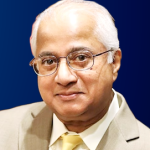
Dr. Mike Mohamed Ghouse is a Social Scientist, Public Speaker, thinker, author, newsmaker, and interfaith wedding officiant. He is deeply committed to Pluralism in Religion, Politics, and Societies along with Human rights, and religious freedom. He is the founder and president of the Center for Pluralism, Director at World Muslim Congress a think tank and a wedding officiant at Interfaith Marriages. His new book American Muslim Agenda is available on Amazon and “Standing up for others” is coming soon. He is committed to building cohesive societies and offers pluralistic solutions on issues of the day.
A Hindu’s perspectives on Kafir
–Dr. Dilip Amin
It is understanding and respect for each other’s religious beliefs that can bring peace and harmony in today’s communally fractured world. Concepts and words such as Kafir and heathen have derogatory connotations and it would be inappropriate to reduce the entire population of 2 billion Hindus, Buddhists, Jains and Sikhs this way.
There are many ways to salvation or moksha. Similarly, there are many ways of expressing the art of surrender, submission, and devotion. Such devotion is called Islam in Arabic and bhakti in Sanskrit.
Hinduism teaches there are four paths to Yoga (union with God): Raja (meditation), Gnana (knowledge), Karma (good work) and Bhakti Yoga. No one path is better than the other and a person can follow one or all as per his or her prakriti (nature).
Hindus believe Moksha is possible for anyone who does good karma, irrespective of what name or shape is used to achieve this ultimate spiritual freedom. Interestingly, this also includes those who don’t believe in the existence of God (nastic).
God is all Knowing and full of perfect Wisdom. God is the only arbitrator armed with the Divine insight to pass judgment on us, not a human being. Therefore, it would be wrong for an individual or for a group to stereotype people from a certain faith as kafir or heathen.
On a personal note, the author got his last name AMIN because, in 1802, his great grandfather Nandlal saved the life of a Muslim king Nur Khan. It is not pleasant now to hear that Nandlal’s great grandson is a kafir. Alternatively, if the author (and his son) is not a kafir but a believer, his son will have no need to change his Hindu religion if a Muslim girl wishes to marry him.
Conflicting statements in the Quran and Geeta
This statement in the Quran 3:85, “If anyone desires a religion other than Islam, never will it be accepted of Him” (and Quran 3:19) may be interpreted as an exclusivist supremacist message. However, if God had willed, all humanity would have been of one single community, but God chose to make us diverse.
Some statements in the Quran could be of concern to the Hindus if they were to be seen as kafirs. However, they would automatically cease to be of concern if the deeper interpretation embraced the Hindus as believers in their own right, albeit belonging to a different religion.
Likewise, some statements by Lord Krishna in the Geeta could be disturbing for the Muslims and for the people of other Abrahamic faiths, if Krishna is perceived as a mere person and not the Ultimate.
Scriptures cannot be changed now, but we can learn to understand them in a historical perspective, and glean those statements which would help us to move forward in a spirit of positivity.
Pluralism in a practical situation
Interfaith marriage is the best tool to understand and explain pluralism.
A pluralist Muslim and Hindu couple would say:
- Hindus are not polytheist and idol-worshiper, but have different ways of expressing their devotion.
- Muslims and Hindus are “believers” as described in the Quran and Geeta. Muslims and Hindus are not kafir.
- The Quran (including 2:221 and 60:11) does not restrict a marriage of a “Hindu” to a Muslim, considering Hindus are also believers:
- Religious conversion of the Muslim to Hinduism, or the Hindu to Islam, is not necessary for the marriage.
- A Muslim woman can marry a non-Muslim man
- Hindu-Muslim couples can raise children in TWO faiths–Hinduism and Islam.
- Hindu-Muslim children can alternate between the Mosque and the Mandir, and be taught both Quran and the Geeta. Later as children step into adulthood, the interfaith couple should give them the freedom to decide as to which faith they want to follow.
For interfaith marriages, selective believing in the Quran 2:221 (interpreted as–a Hindu must convert for marriage with a Muslim) but ignoring Quran 24:30 (not okay to get into romantic relationship under the guise of true love) is a matter of concern.
An exclusivist supremacist will want the Hindu to convert for the Hindu-Muslim interfaith marriage because Hindus are non-believer kafir/heathen. There is no other reason to ask for conversion.
Author’s personal experiences for pluralism in marriages:
The author has guided some 800 youths in love relationship involving a Muslim and found that in most cases (90+%?) the Muslim will want the non-Muslim to convert to Islam for Nikah or want the children to be raised only in Islam.
The author’s survey found 45% of Muslims marry outside their faith in the USA. It is not clear how many of these Muslims are true pluralists and are ready to raise children in both faiths.
Except Dr. Ghouse, Imam Iftekhar Hai and the Ismaili communities, the author has not found any Imam willing to conduct Hindu-Muslim marriages (read Sunni Muslim’s position).
Most Muslim majority nations will not approve Hindu-Muslim marriage and even have laws against it.
A Pakistani friend told the author that you will not find a single “Hindu”-Muslim couple in the whole of Bangladesh and Pakistan. And even if one such interfaith couple were to be found in these countries, they would be hounded and killed.
One can only hope and pray that such extremist individuals can espouse the spirit of pluralism and find it in their hearts to allow love to manifest through interfaith marriages. Compared to the distressing situation in these countries, one can find thousands of Hindu-Muslim couples living a dignified and harmonious life in India.
In a similar vein, for some exclusivist Christian churches, the Hindus are non-believer heathens. And so, before entering into a wedlock with their Christian partners, they are either expected to convert to Christianity or sign a prenuptial agreement stating that their offspring would be baptized and raised only in the Christian faith.
Note we are not against an individual’s religious freedom (to change faith), but against the mandate by religious institutions and faith leaders to link the (fake)conversion with an interfaith marriage.
To ask for religious conversion after years of romantic relationship is an ugly form of love proselytism and should be condemned.

Dr. Dilip Amin: The author is a Director of the Peninsula Multifaith Coalition of the San Francisco Bay area and a certified speaker at Islamic Networks Group. He is a Dharma Ambassador and on the Advisory Committee at the Hindu American Foundation. He is a jail chaplain and a Columnist at Patheos. Dr. Amin has co-authored the book Hindu Vivaha Samskara. He founded the web forum InterfaithShaadi.org and guided 1200 youths and summarized his experiences in the book–Interfaith Marriage: Share & Respect with Equality. He is also the founder of HinduSpeakers.org.
Summary
Hindus are not kafir or heathen. The religious exclusivity and supremacist beliefs have often resulted in the practice of religious conversion in an interfaith marriage. True respect for others’ religious beliefs will bring peace and harmony in today’s world. It is time to give up the practice of religious conversion for interfaith marriages.
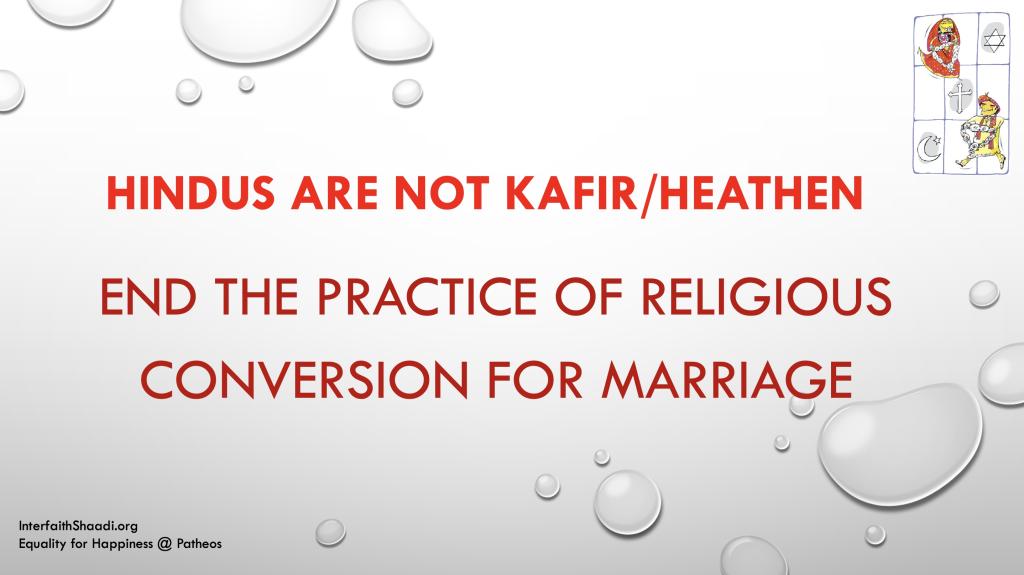
@@@
It is an open request for all faith leaders to endorse or reject this idea. Please share your views below.
Please forward this message to other faith leaders and ask them to clarify their position on this questionable practice of expectation of religious conversion for interfaith marriage.
Names of those who are endorsing the message here:
Mohammad Asghar, Philip B. Auerbach, an Interfaith Dialog Leader,
Names of those who believe Hindus are kafir and reject messages in this article:
Names of those who decided to remain silent:



- FAMILY RSS
- TAGGED WITH:
- PROGRESSIVE CHRISTIAN
- PAGAN
- …MORE
